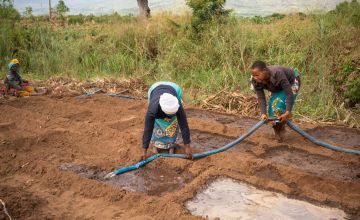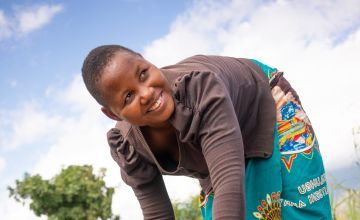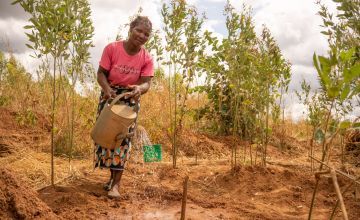
Read our 2023 annual report

Knowledge Hub
Droughts and dry spells have serious consequences for communities, leading to crop failure, wildfires and water stress. They are particularly damaging to agricultural communities, who rely on the success of their crops to provide for their families’ wider economic security.
Concern Malawi’s irrigation projects work with these communities to develop the structures and systems that they need to sustainably maximise their crop yields and to maintain the quality of the soil for future generations.
These projects’ focus on resilience and market systems aligns directly with the key theme of this year’s World Day to Combat Desertification and Drought - ‘the need for early action to avoid consequences for humanity and the planetary ecosystems’.
Malawi is one of the top 10 countries most affected by climate change.
Large-scale droughts and floods are becoming commonplace. In 2016, a prolonged dry spell during the growing season left 6.5 million people without food.
Rising global temperatures expose small rainfed mono-cropping agricultural households (approximately 80% of Malawians) to potentially disastrous crop failure. Concern Malawi works with these communities to mitigate against the impact of the increasingly unpredictable rainfall patterns, drought and dry spells, and to sustainably provide for the future.

Bringing households out of poverty
In Chikwawa, Mwanza, Neno and Nsanje districts, Concern and our local partners Eagle’s Relief and Development Programme International, with funding from the EU, Irish Aid and the UK Harambee public appeal, are working with communities to build resilience and graduate households out of poverty.
An emphasis on irrigation addresses the dependence on rainfed agriculture, and supports market-oriented cash cropping. Funds from Irish Aid and UK Harambee Public Appeal Funds support farmer groups to scale up irrigation using solar powered irrigation systems.
These systems allow farmers to plant a second (and often third) crop each year, increasing their food security and generating surplus produce, which households sell to meet their housing, fuel and schooling needs.
The project is designed in response to Ministry of Agriculture policies and was developed in co-operation with District Irrigation Officers within District Councils. This year’s iteration will also work closely with Ministry of Agriculture district officials to target communities best suited to taking part in irrigation projects.
Concern is also building on our experience, and the lessons learned, from our previous irrigation projects under the UK Aid funded PROSPER programme, which promoted treadle pumps.
This year’s programme targets extremely poor communities, many of whom are Social Cash Transfer beneficiaries under the government social protection programme.
Chikwawa and Nsanje are among the most disaster-prone regions of the country, experiencing prolonged dry spells, strong winds, floods and pest and disease outbreaks. The project leverages the region’s location along the Shire River, allowing farmers to utilise the river’s resources year-round.

The solar pumps increase the prosperity of the farmers in the community.
Under the project, irrigation group members form a co-operative, which collectively owns the pumps, and provides economies of scale that enables them to participate in more profitable value chains.
From the profits generated from crops irrigated by the solar pump, the community contributes funding to repay the cost of the equipment, which will enable purchase of irrigation equipment for a subsequent group. The focus on producing profits encourages an enterprise mind set within the targeted communities and embeds the new co-operative within local value chains.
The co-operatives are encouraged to grow high value crops and cash crops to maximise their returns from the value chains supported by the project. Most communities in rural Malawi are subsistence farmers, with the majority of farmers relying a single crop of maize each year.
This maize crop often does not produce a sufficient yield for farmers to sell their surplus or allow them to develop a resilient livelihood.
Denesi Chnagwera, from Moffat Village, TA Symon met with our team last week. The irrigation pumps have transformed the community’s approach to agriculture, and Denesi tells us, “we’re able to plant crops 3 or 4 times a year!”
This enhanced production is increasing the economic resilience of the community. Or, in the words of Mercy Smart, also from Moffat Village, “tomatoes are great - tomatoes are money!”
Developing the irrigation groups

Following the successful rollout of 18 irrigation pumps last year, this week the Concern teams are meeting with communities to identify suitable sites for 58 six new irrigation pumps in the coming months.
To maximise the potential of the irrigation pumps, the teams will identify locations that have ready access to water, and may already be conducting irrigation activities using manual irrigation (watering cans, buckets, etc) or treadle pumps.
Additionally, the communities must have the capacity to take part in the project, agree to the repayment plans, and develop business plans outlining how they will access available markets.
The chosen communities will engage in a specific training programme developed by the Concern and the District Agriculture Office.
This training will support the development of the irrigation groups, and provide the communities with guidance on maximising the potential of the group when working together and the best practices for developing co-operative governance structures.
The Concern team will also provide training on the agricultural techniques and business planning skills, in collaboration with the District Agri-Business Officers.
Our impact in 2023
people reached through our emergency response
people reached through our health interventions
people reached through our livelihoods programmes


